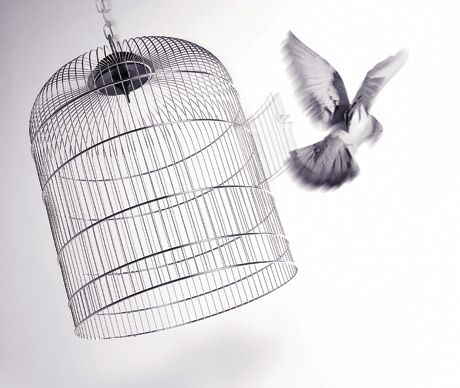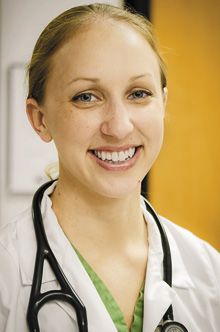I paid off my student loans in five years
This young veterinarian got free of her six-figure debt fastand shes loving the freedom it brings.

Getty ImagesI paid off my veterinary school debt just shy of my five-year graduation anniversary. It was one of the happiest days of my life-but it was no easy feat. There were sacrifices, of course, along with a series of decisions I made with my financial goals in mind. Those things, along with a little bit of good fortune, made it possible. I'd like to share my story in the hopes that it will inspire my colleagues to take control of their debt and to help students and veterinarian-hopefuls see that it can be done.
While I completely agree that veterinary school debt is out of control, it isn't going to stop being a problem tomorrow. For that reason, it's imperative that we find ways to manage and conquer the inevitable debt that comes with our chosen profession.
First steps
The financial aspect of attending veterinary school was something that weighed heavily on me before I even applied. I decided to apply only to Purdue, my in-state school, because I believed the debt would be too crippling if I attended an out-of-state school. Fortunately I got in! When I entered the Purdue University School of Veterinary Medicine in the fall of 2005, I received financial counseling, along with stacks of papers outlining the debt I was incurring and how long it would take me to pay the loans off. I could not begin to comprehend paying on this debt for 25 years. I resolved then that I would, one, find a way to limit the debt incurred as much as possible and, two, come up with a plan to pay it off in 10 years or less once I graduated and got my first “real” job.

Dr. Brooke DooleyDuring school I chose to live off-campus, across the river in Lafayette, which saved me a considerable amount in rent. I had already paid for my car in undergrad (as you can see, I really hated debt!). I took on extra small jobs around the vet school, such as working in the student bookstore and being a student representative for a veterinary company. I was also fortunate to receive some scholarships. Some were need-based and others were for my service in clubs. In the end I netted about $100,000 in debt for veterinary school, plus $20,000 for undergrad and $3,000 that I borrowed from my parents-a sum total of $123,000, give or take.
When it came time to graduate and choose my first job, I wound up through a serious of events looking for employment in Austin, Texas. I had two great job offers-it was a tough decision to make. The deciding factor came down to money, stability and benefits. I was offered an above-average salary for a new graduate, and I was super-excited about a 401(k). My boyfriend (now my husband) and I moved into a rental house. He had been working for the previous four years and had saved enough money for the initial rental expenses. Otherwise we split living expenses down the middle.
Working it off
The first thing I did with my paychecks was to pay my parents back. Then I got on daveramsey.com, a site dedicated to helping people pay off debt, and used the mortgage calculator to plug in numbers to see what I had to pay each month to pay my loans off in 10 years. My husband wasn't working at the time, but he had enough in savings to pay for his half of our expenses. It seemed like it wouldn't be too difficult to make those larger payments. From there on out, no matter what happened, I treated those student loan payments as my top financial priority.
You may be wondering how my payoff period changed from 10 years to five years. Along the way, three things happened. First, I started making more money. I became a more efficient and more confident clinician, which led to increased production (I was on a ProSal pay plan). Also, I picked up extra shifts one to two times per month to increase my earning potential. Second, my husband got a great job. Third, we both become more motivated by seeing those debt numbers drop and thinking about how much money we were saving in interest. Every six months we held a family budget meeting to recalculate and reinvigorate our debt-payment plan. I started using personal-budgeting website Mint.com to monitor where every dollar went and following Dave Ramsey's “debt snowball plan” (see the box below), the only difference being that I paid the highest-interest loans first rather than the lowest balance, as he suggests.
Dave Ramsey's debt snowball plan
Here's how the debt snowball plan works, according to debt-busting guru Dave Ramsey. You pay minimum payments on all of your debts except one, and you attack that one debt with everything you've got. “We're talking gazelle intense, sell-out, get-this-thing-out-of-my-life-forever energy,” Ramsey says on daveramsey.com. Once you've paid that debt off, you take the money you were putting toward it, plus any extra funds you find, and attack the next debt on the list. Once it's gone, take that combined payment and go to the next debt. The money you have available for paying off your debts builds, like a snowball, enabling you to knock them out one by one.
That's not to say I was a saint this entire time. We enjoyed eating out-there was a budget for that. We bought a new house, the down payment coming from my husband's savings. Had we not had that money saved (he'd lived off turkey sandwiches in the early years when he was working), we probably would not have purchased the house. I did buy a car in 2010 after my old one started costing more to maintain than a new one. I got zero percent financing and purchased a gently used model.
What we didn't do was go on vacation or on a honeymoon. I rarely shopped for new clothes unless something in my current wardrobe got holes, became stained or simply fell apart. We spent a modest amount for our wedding and were lucky enough to have our parents help us out a bit. I did set up a savings budget for our wedding from the time my boyfriend and I moved in together, setting aside a little bit here and there. I didn't want to completely give up a wedding!
It's the big things that count
Looking back, I realize now that it wasn't the small things that made the biggest difference. In fact, I never truly felt deprived. I could eat lunch out frequently or stop and grab a latte without worrying about the budget. The thing that made the biggest impact were those big financial decisions. Choosing not to go on trips, buying a house with a mortgage that was the same as our rent, and being thoughtful with any purchases over $100 were the main contributing factors to our success. I remember feeling sad that we didn't go on a honeymoon, but now we have the freedom to take even better trips without the weight of the debt holding us back. Being debt-free releases immense power to build wealth. My husband and I still have to work on the mortgage and now make some catch-up retirement contributions.
I am tremendously proud of myself for sticking with the plan for the past five years and feel good about the path I took anytime there was a fork in the road. You may have noticed that I did not mention children-this was a conscious decision on my part as I hear they're quite expensive. That's a very personal choice and it should be factored into your own debt repayment plans.
Ultimately, my advice to my fellow veterinarians is to examine your personal values and your tolerance for sacrifice and then objectively evaluate your current debt, income and budget to set an achievable goal that works for you. As life changes, so too will your financial picture. Regular check-ins are important. Think of it as preventive care (an annual or semi-annual physical exam, with bloodwork, and maybe even a dental cleaning) for your life.
Dr. Brooke Dooley is the San Antonio/West Texas medical director for Banfield Pet Hospital.